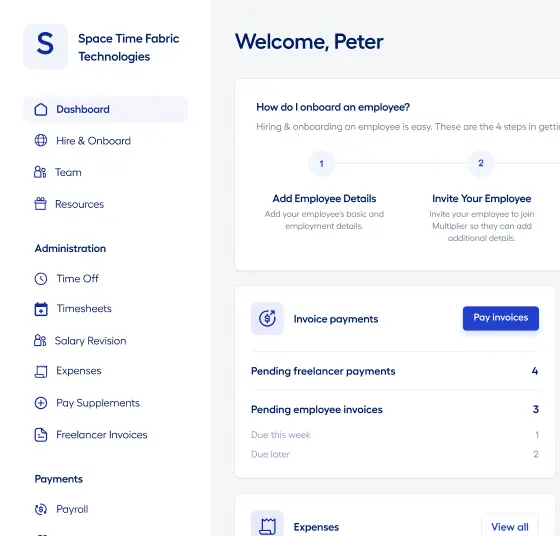Hiring the right team for your business can be a challenging task. It requires a mix of intuition, time, and trust. One common dilemma that many business owners face is whether to hire full-time employees or contractors.
Choosing only one type of worker may limit your business’s benefits and opportunities. For instance, if you only hire contractors, you may miss out on the long-term commitment, loyalty, and expertise that full-time employees can bring to the table. On the other hand, if you only hire full-time employees, you may miss out on the flexibility, cost-effectiveness, and specialized skills that contractors can offer.
To make an informed decision, it’s essential to understand the differences between full-time employees and contractors. This article will provide an in-depth explanation of how these two types of workers function, equipping you with the knowledge to make the right hiring decisions and build a successful team that can take your business to new heights.
Hiring Employees vs. Independent Contractors
When it comes to hiring for your business, it’s crucial to understand the difference between a full-time employee and a contractor. A full-time employee requires supervision, direction, and tax compliance, while a contractor provides services independently in exchange for payment. Misclassifying workers can lead to severe consequences, including retroactive payroll taxes, legal fees, and hefty fines.
In this article, we’ll explore the traits that define each type of worker in-depth, equipping you with the knowledge to make informed hiring decisions and avoid potential legal complications. Additionally, we’ll discuss the benefits of converting contractors into full-time employees and how it can help your business grow and succeed.
Defining a Full-Time Employee: Who is a Full-Time Employee?
Generally, full-time employees are those who require direction and supervision from their employers on how, where, and when to perform their tasks. They often work on a long-term basis and are heavily dependent on their direction from their heads. As the employer, you are responsible for supervising and monitoring their work performance, as well as reporting and paying payroll taxes on their behalf.
Defining an Independent Contractor: Who is an Independent Contractor?
Independent contractors operate as a separate business entity. They provide services in exchange for payment. Unlike a full-time employee, you’ll agree on project details and payment before entering into a contract with them.
Independent contractors typically send out an invoice for their services and work on a project-by-project basis or a short-term contract. They also provide their own equipment and supplies and are responsible for paying their own taxes, including local, state, federal, social security, and health insurance.
In simple terms, an independent contractor is a temporary worker who is independent of your company or business. While many startups opt for freelancers due to their flexibility and lower rates, there are risks associated with hiring independent contractors, such as mismanagement, lack of control over the work performed, legal liability, and more.
Understanding the IRS Guidelines for Employee Classification
To determine whether your workers are full-time employees or independent contractors, the IRS usually considers the following factors:
- Relationship: Do the workers’ responsibilities involve developing relationships with customers/clients and co-workers?
- Financial control: Do you pay payroll taxes? Do you control benefits, such as sick days and vacations? Do you determine salary pay rates?
- Behavioral control: Do you determine the workers’ schedules and methods for performing their tasks?
If you answer yes to one or more of these questions, the IRS is likely to classify your workers as full-time employees.
When Should You Hire an Independent Contractor?
If your project requires minimal supervision and has a short completion time, an independent contractor may be the perfect option for you. Working with independent contractors involves little long-term obligation, making it a more cost-effective option as you only hire them when needed.
Independent contractors offer diverse work experiences and stay up-to-date on the latest trends and technologies. For small businesses with limited funds and time, training new employees can be challenging, and contractors can offer their expertise for a task in a short time.
For small businesses with limited funds and time, training new employees can be challenging, making contractors an attractive option for their expertise.
So, when is it best to hire a contractor? Here are some specific scenarios:
- Heavy-duty maintenance that requires infrequent attention
- Assistance with specific, remote bookkeeping and administrative duties for a few hours every week
- Help with customer service or order fulfillment during a particularly busy time
- Expert competencies in areas such as software programming, data mining, copywriting, online marketing, website design/development, and more.
Overall, independent contractors are a great option for businesses looking for specialized skills, flexibility, and cost-effectiveness.
When Should you Hire a Full-Time Employee?
When it comes to full-time employees, choosing the right full-time employee for your company is crucial. You want someone who not only fills the position but also fits in with your company culture and is committed for the long haul.
One of the advantages of having full-time employees is the sense of fellowship they bring to the workplace. With time, they become invested in the company’s success and contribute to a positive work environment.
Here are some scenarios where full-time employees can be especially beneficial:
- Developing Relationships: Full-time employees who are in-office regularly have a better understanding of what’s going on with the business compared to contract workers. This makes them ideal for developing important relationships with customers, clients, and co-workers.
- Tasks Requiring Close Supervision: Full-time employees with daily pre-set hours are better suited for jobs that require close supervision and timely reporting.
- Succeeding in Local Markets: Full-time employees already familiar with the target market can help with business expansion by using their contacts and knowledge of local trends.
Overall, full-time employees bring a valuable sense of commitment and community to the workplace, making them an excellent choice for businesses looking for long-term, hands-on support.
Understanding the Cost Differences
The cost difference between hiring full-time employees and contractors can be significant. Full-time employees come with additional expenses such as health insurance, sick leaves, and vacation time, while contractors have higher pay expectations due to their expertise. However, contractors offer flexibility and work on a project-by-project basis, making them a more affordable option in certain scenarios.
Ultimately, choosing the right type of worker comes down to your project and requirements. Scrutinizing factors such as legal liabilities, cost-benefit, and your business’s current and long-term needs will enable you to make informed hiring decisions and build a successful team.
Which is More Affordable? Full-Time Employees or Contractors?
Ultimately, the decision between hiring full-time employees or contractors comes down to your project and requirements. It may even be a combination of both that best suits your business needs. To make the right decision, it’s important to consider the legal liabilities of misclassification, the cost-benefit of short-term responsibility versus long-term relationships, and the current and long-term needs of your business. Scrutinizing these factors will enable you to choose the best option for your business.
Conclusion
Full-time employees and contract workers both have their advantages and disadvantages and can be extremely beneficial for specific tasks. As a business owner, it’s a must for you to examine these differences, consider your projects’ requirements, and then choose the right type of worker.







